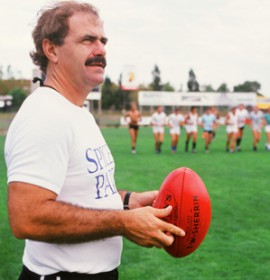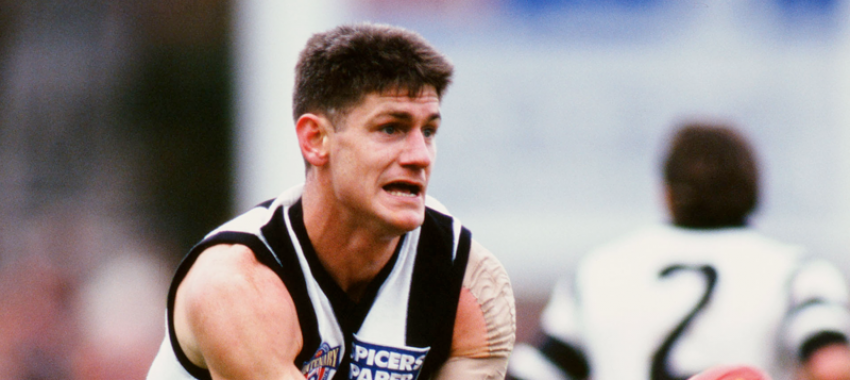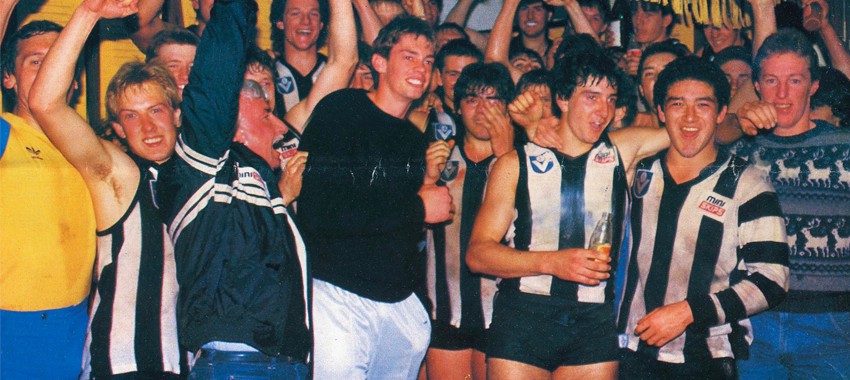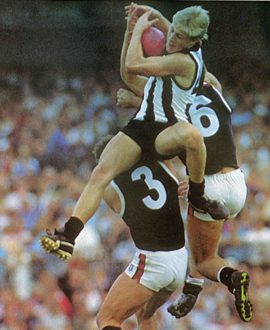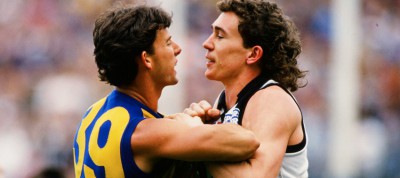When Brian Taylor was a kid, if you'd told him he was going to be a star in one sport, it almost certainly wouldn't have been football.
In Taylor’s early days at Mandurah, a coastal town about 100km south of Perth, football hardly got a look-in. He represented his home State, Western Australia, in basketball at under-16 level and played alongside several boys who went on to represent the Perth Wildcats in the National Basketball League. His mother had started the local basketball competition, and Taylor was a fanatic. And if it was not basketball it was motorbikes and motocross contests that grabbed the young man’s interest.
In fact, BT did not play competitive football until he was into his teens. Just two years later he was in the WA Teal Cup team, and soon after that, at the age of 16, he was wooed by Richmond. Football offered opportunities that basketball could not, so it was football that won out. In the 12 years that followed he enjoyed a highly successful and at times controversial League career that saw him become only the fourth player in Collingwood’s history to kick 100 goals in a season, and then later one of its most well-known media stars.
“It was every kid’s dream in Western Australia to play in the VFL,” he said. “In fact it wasn’t even a dream for me. It was too far beyond a dream to be involved in the competition over here (Victoria).”
When Taylor came across in 1979 to join Richmond's under-19s, he did so amid the sort of publicity usually reserved for established interstate stars rather than 16-year old kids who had only been playing footy for a couple of years.
He struggled to settle in at first, eventually making his debut in 1980 (where he was towelled up by the great Bruce Doull). It wasn't until 1982 that he became a regular senior player, kicking more than 70 goals from 15 games alongside star full-forward Michael Roach. But he injured himself in the last game of the year and could not take his place in the second semi-final team, then was passed over for selection in the Grand Final. Taylor was shattered. He struggled with injuries in 1983, then was again in and out of the Tiger line-up through 1984. The frustration was becoming too much. The Magpies had a gaping hole at full-forward and, already engaged in a recruiting war with Richmond, thought nothing of luring “Barge” to Victoria Park for season 1985 to join his ex-Tiger teammates David Cloke and Geoff Raines. He was so keen for regular game time that he actually accepted less money to join the Pies.
The move worked wonders. BT kicked 80 goals in that first season, playing under Bob Rose, and Collingwood fans had another full-forward to idolise.
Collingwood took to BT as if he had been black and white all his life. It was not just that he kicked goals; it was the way he kicked them, with big marks and more than a touch of 'agro', that endeared him to Magpie supporters. The burly Taylor stood at 191cm (6ft 2in) and weighed around 101kg (15st 121b) at his peak, making him a difficult man to shift. He was a master at using his ample frame to out-position his opponents, or to keep them from the ball. Like Gordon Coventry, Taylor was particularly adept at using his backside to thwart an opponent’s run at the ball, while taking the mark himself well in front of his body. And, again like Coventry, Taylor’s grip on the ball was vice-like. Whether in one-on-one duels or in packs, Taylor was a near certainty to bring down the ball if he got any sort of purchase on it at all. He could also both leap and lead, especially early in his career, but it was the strong mark under pressure that became the Taylor trademark.
The other trait for which Brian Taylor became well known was his temperament. It was both a vice and a virtue. When fired up and playing well he loved to “stick it up” his opponent. Clenched fists, two fingered salutes, contemptuous pats on the back — BT would use them all to let the full back know he was getting beaten. The crowds loved it, BT seemed to thrive on it and it often lifted the team as well. But on other days, when things were not going so well, Taylor’s histrionics seemed only destructive.
On his day Taylor was well-nigh unstoppable. He could take marks from any position, outbustle opponents and kick goals from any angle. In such moods he could decimate an opposition, as he did to St Kilda in a game at Victoria Park in 1989 when he kicked seven goals in the first half.
There were plenty of those days in 1986, when Brian Taylor became only the fourth player in Collingwood’s history to kick 100 goals in a season. He only just made it, kicking his 100th in the last game of the season after tearing a groin muscle that should have forced him from the field. BT stayed on in the hope of picking up the necessary goal, and after kicking it (courtesy of a soft free kick), limped off almost immediately.
He performed consistently in 1987 and 1988 (60 and 73 goals respectively), without quite reaching the heights of 1986. But in 1989 his hold on the position became tenuous, as Leigh Matthews’ preference for mobility and versatility in his players became increasingly obvious. Taylor had never been really quick (though he was much more agile in his early days than most people remember), but the wear and tear on his legs had slowed him down even further. Full-backs knew they could run off him, and tended to exploit that more frequently.
Taylor managed only 11 games in 1989, but still kicked 49 goals. By 1990, however, his position had deteriorated further. He was given only limited opportunities, and it was clear he did not fit in with Matthews’ plans. He spent most of the year in the reserves, but even there could not avoid trouble, copping a five game suspension (two for striking and three for abusive language) out of one game. When he returned he forced his way back into the senior side and did enough to hold his spot for the qualifying final against the West Coast Eagles.
That game turned out to be Brian Taylor’s last hurrah, but it could so easily have been different. He had four or five shots for goal early in the game and missed all of them, then was taken from the ground during the second quarter. He did not reappear until midway through the last quarter, when the game was slipping away from the Pies. He kicked two crucial goals, including the one that put the team in front.
But those last quarter heroics weren't enough to keep him in the side for the rest of the finals. His VFL career was over.
That 1990 season was a difficult one for Taylor. He released a book, his diary of the season, after the Grand Final, and when the project became public knowledge during the year, he found it upset a number of his teammates. There was also the deterioration of his relationship with Matthews. Then, on the last training night before the grand final, Matthews sent Taylor and six or seven others from the training track after only 20 minutes to allow the final squad to train together. Taylor found the incident embarrassing and humiliating, believing that those players should have been allowed to stay longer with the main group, or not been out there at all.
He tried to captain-coach with Prahran in the VFA but his knees were shot. Instead he went into the media, going on to become one of the most recognisable faces and voices in the game as a gun commentator with Channel 9, Channel 7, Triple M and 3AW.
He probably achieved more fame as a commentator than he did as a footballer, but at Collingwood we still like to think of him as 'one of ours'. He kicked 371 goals from his 97 games in the black and white, and left a lasting impression on all Magpie fans who watched him rule the goalsquares in the 1980s.
- Michael Roberts


